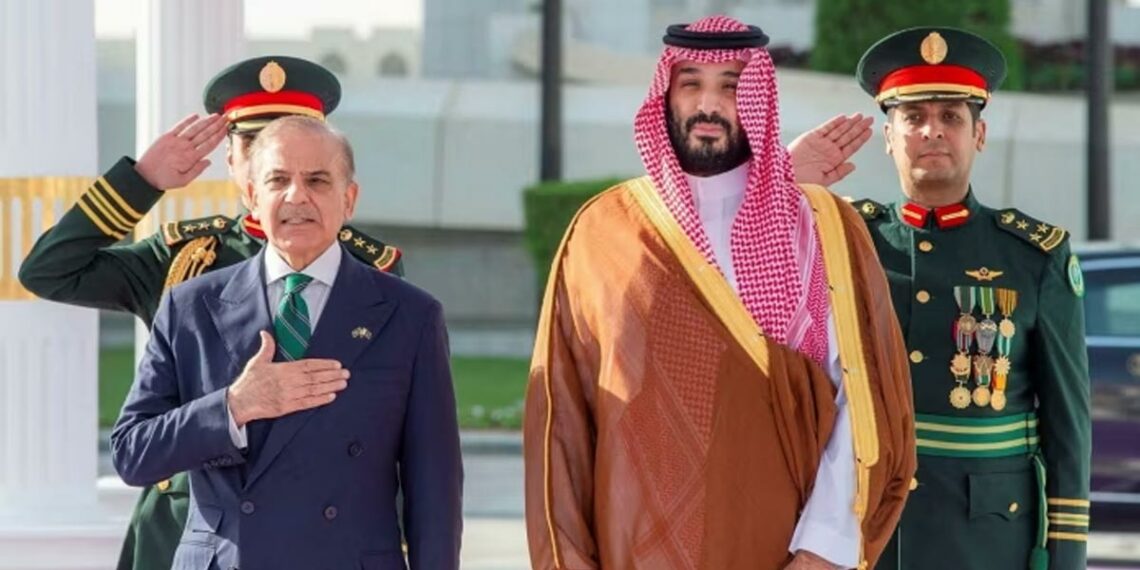The shifting sands of West Asia have once again forced India into the centre of a geopolitical storm. Two dramatic developments, occurring almost simultaneously, have altered the balance of power and disrupted New Delhi’s carefully constructed strategies.
On September 17, 2025, Pakistan and Saudi Arabia formalized a Strategic Mutual Defence Agreement that obliges both nations to treat an attack on one as an attack on the other.
Within days, the Trump administration revoked India’s long-standing sanctions waiver for developing Iran’s Chabahar Port, ending a critical exemption that had served as the lifeline for India’s ambitious regional connectivity vision since 2018.
The Saudi-Pakistan defence pact is far more than another bilateral arrangement; it reshapes the regional security architecture. For the first time, a nuclear dimension has entered Gulf geopolitics.
Pakistan has tried to downplay the nuclear implications, with its Defence Minister Khawaja Muhammad Asif asserting that such weapons were “not on the radar” of the agreement.
Yet a senior Saudi official’s statement that the pact encompasses “all military means” has triggered feverish speculation about extended deterrence and the possibility of Riyadh one day leaning on Pakistan’s nuclear umbrella.
Western media The Financial Times and The Washington Post quickly amplified these concerns.
The timing of these developments could hardly be more telling. Israel’s September 9 airstrike on Doha, targeting Hamas leaders during ceasefire negotiations, shattered assumptions about both Israeli restraint and the reliability of American protection.
Qatar, a major non-NATO US ally and traditional mediator in regional disputes, suddenly found itself exposed.
For India, the blow from Washington was equally severe. The revocation of the Chabahar waiver is not just a matter of commerce.
Over $120 million had already been invested in the Shahid Beheshti terminal, with a May 2024 agreement granting India operational rights for a decade and plans to quintuple capacity by 2026.
Now, with one stroke, that project is under a cloud. The US has justified the move as part of its “maximum pressure” campaign against Iran, but for India the implications are harsher endangering its strategic autonomy
New Delhi’s official responses to both shocks have been muted. On the Saudi-Pakistan pact, the Ministry of External Affairs noted that the arrangement had long been under discussion and promised to study its implications.
On Chabahar, the reaction was similarly cautious, with officials saying only that they were “examining its implications.” Such restraint reflects a careful balancing act. Saudi Arabia, after all, remains India’s fourth-largest trading partner with over $41 billion in bilateral trade—dwarfing Saudi-Pakistan commerce.
Yet beneath this calm exterior lies deep unease. Experts such as former Ambassador Prabhu Dayal warn that while Saudi Arabia may avoid jeopardizing its ties with India, the pact could embolden Pakistan, complicating New Delhi’s punitive deterrence posture.
International analysts go further, describing the agreement as a fundamental shift away from US hegemony toward a multipolar Gulf order.
India, then, faces an intricate set of challenges. It must secure clear assurances from Riyadh that the defence pact will not apply to Indo-Pakistani disputes.
It must simultaneously seek alternative connectivity corridors—accelerating discussions with Oman about the Duqm Port, leveraging the UAE’s Jebel Ali, and pushing forward other regional routes to reduce reliance on Chabahar.
It must continue to resist external pressure to pick sides in the US-China rivalry, preserving its doctrine of strategic autonomy. And it must recognize the likelihood that Pakistan will now seek advanced weaponry and financial lifelines from Saudi Arabia, compelling India to intensify its own defence modernization by boosting indigenous production and diversifying reliable partnerships with countries such as Israel and France.
It should be emphasized that India’s economic clout in the Gulf remains its strongest card. Millions of Indian expatriates, vast energy partnerships, and investment flows ensure that no Gulf nation can easily ignore India’s role in its prosperity.
New Delhi must work to deepen this indispensability, even while managing political sensitivities. It must also proactively shape global discourse by engaging think tanks, media, and diplomatic networks to explain its position and highlight the risks of nuclear proliferation.
Ultimately, these events are not isolated misfortunes but part of a larger global transition. The erosion of America’s uncontested dominance, the rise of multipolarity, and the constant jockeying of regional powers mean India cannot rely on static alignments.
Instead of reacting piecemeal, it must embrace a strategy of proactive engagement, anticipating shocks, building redundant partnerships, and ensuring multiple options for connectivity, defence, and diplomacy.
This moment demands a careful blend of patience and flexibility. The Saudi-Pakistan pact, while troubling, does not overturn the balance of power so long as Riyadh values its diverse international partnerships, including with India.
The Chabahar setback, while painful, need not derail India’s connectivity ambitions if New Delhi swiftly diversifies its options. The real test lies in India’s ability to maintain composure, avoid hasty commitments, and use adversity as an opportunity to reinforce its strategic autonomy.
In this effort, India can draw from its own civilizational reservoir of wisdom. Centuries ago, Chanakya, the great strategist of the Mauryan age, framed the dilemmas of power and diplomacy in words that remain startlingly relevant. He warned that alliances are rarely absolute, that states must constantly adapt to shifting circumstances, and that every policy must be weighed against its long-term consequences. His six-fold policy—peace, war, neutrality, alliance, marching, and dual policy—was not a rigid formula but a call for flexibility and foresight.
As he put it, before beginning any venture one must ask three questions: Why am I doing it, what results might it yield, and will I succeed?
Only when the answers are clear should one proceed. In today’s turbulent West Asian theatre, India must heed this timeless counsel.
By thinking deeply, anticipating outcomes, and keeping its national interest at the core, New Delhi can transform this strategic crossroads into a demonstration of its maturity as a great power.















